Whereas page E:26 could allude to the Sun (5,
12, 19, 26 ...) and page E:25 to
Saturn (4, 11, 18, 25 ...) - for here it
was described how makoi (→ Makoi)
generated fire -
page E:27 may have alluded to the
number of days the Explorers stayed at Oromanga.
Notably makoikoi meant kidney, the organ
which generates urine.
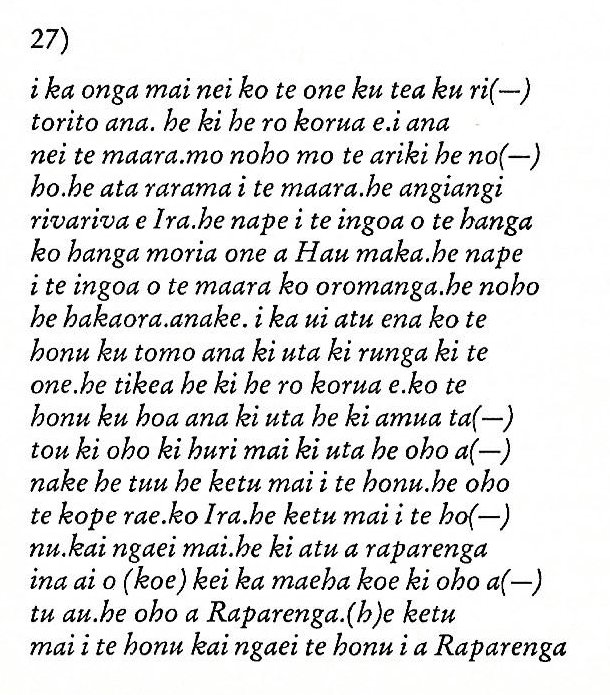
|
E:25 |
| i hoa era i te
ika ki uta he ki a Ira.ka
too mai |
After they had
thrown the fish on the beach, Ira
said, |
|
Too.
1. To adopt, to
take, to acquire, to admit, to
accept, to gather, to dispose, to
seize, to pull up, to extirpate,
stripped, to withdraw, to intercept,
to frustrate, to touch, to employ,
to serve; tae too, to
renounce. Mq.: too, to take,
to receive, to accept, to adopt, to
seize, to pull up. 2.
Raa too,
noon. 3. Numeral prefix. P
Mgv.: toko, id. Mq.: toko,
too, id. Ta.: too, id.
Samoa and Futuna use to'a and
toka, Tonga and Niuē use
toko, and the remainder of
Polynesia uses the latter form.
Tooa: kai tooa, intact,
entire, whole; paea tooa, to
deprive. Churchill.
Puhi. 1. To blow; to
light a fire; to extinguish, to blow
out; he-puhi te umu, to light
the fire for the earth oven. 2. To
fish for lobsters at night using a
bait (but during the day one calls
it hî); puhiga, night
fishing spot. Vanaga. To blow;
puhi mai, to spring up;
pupuhi, wind, fan, to blow,
puffed up, to blow fresh, to
ferment, to swell, to bloat, to
spring out, to gush, yeast;
pupuhi vai, syringe; pupuhi
eve, squirt; pupuhi heenua,
volley; pupuhi nunui, cannon;
pupuhi nui, swivel gun;
ahuahu pupuhi, amplitude; vai
pupuhi, water which gushes
forth; pupuhihia, to carry on
the wind; hakapupuhi, to
gush, leaven, volatilize;
puhipuhi, to smoke, to smoke
tobacco, a pipe. Churchill
Puku. 1. To feel an urge
to defecate or to urinate, etc.:
ku-puku-á te mimi: to need to
urinate. 2. Rock, boulder: puku
ma'ea; puku oone,
hillock, earth mound. 3. Puku
tagata, pubis. Puku-ine,
to get stuck in the oesophagus (of
food). Pukupuku, joints,
bones of a joint; pukupuku rima,
wrist bones; pukupuku va'e,
ankle. Pukuraga, followers,
disciples, students. Vanaga. 1.
Puku haga oao, east, east wind.
2. Pubes. T Mgv.: puku,
clitoris; pukuhou, the age of
puberty; pukutea, a man
between 30 and 45. 3. Unripe;
puku no, unripe; pukupuku,
green, immature. Mgv. puku,
to be unripe. Mq.: puku, a
fruit which has not yet reached its
maturity. 4. To gorge; mahaga
puku, to take the bait greedily.
PS Sa.: pu'u, to take the
whole at one mouthful, to put into
the mouth whole. Fu.: pukupuku,
to rinse the mouth, to gargle. Niuē:
puku,
to take into the mouth.
Pukuhina,
(puku
4), to choke on a fishbone. Pau.:
pukua,
to choke with a fishbone. Mgv.:
pukua,
to be suffocated by anything that
sticks in the throat. Mq.:
pukua,
bad deglutition. Ta.:
puunena,
puufeto,
to choke, to gag. Ha.:
puua,
to be choked, to have something
sticking in the throat.
Pukupuku;
1. Elbow. G. 2. Wrinkled, knotty,
wen, scrofula; gao
pukupuku,
scrofula. T Pau.: puku,
a swelling; pukupuku,
a wrinkle, knotty, rough. Mgv.:
puku,
a knot in the wood;
pukupuku,
knotted, rough, uneven, lumpy. Mq.:
puku,
knot in wood, boss, protuberance,
tumor, boil; pukupuku,
wrinkled, knotty. Ta.: puú,
boss, protuberance, swelling;
puúnono,
tumour; puúpuú,
wrinkled, knotty. Pukuraga,
servant T. Churchill.
Hu. 1. Breaking of wind. T
Mgv., uu, to break wind. Mq.,
Ta.: hu, id. 2. Whistling of
the wind, to blow, tempest, high
wind. P Pau.: huga, a
hurricane. Churchill. Mgv.: hu,
to burst, to crackle, to snap. Ha.:
hu, a noise. Churchill. |
|
Ahi. Fire; he-tutu i te
ahi to light a fire. Ahiahi
= evening; ahiahi-ata, the
last moments of light before
nightfall. Vanaga. 1. Candle, stove,
fire (vahi); ahi hakapura,
match; ahi hakagaiei,
firebrand waved as a night signal. P
Mgv.: ahi, fire, flame. Mq.:
ahi, fire, match, percussion
cap. Ta.: ahi, fire,
percussion cap, wick, stove. 2. To
be night; agatahi ahi atu,
day before yesterday. 3. Pau.:
ahi,
sandalwood. Ta.: ahi,
id. Mq.: auahi, a variety of
breadfruit. Sa.: asi,
sandalwood. Ha.: ili-ahi, id.
Ahiahi, afternoon, night;
kai ahiahi, supper. P Pau.,
Mgv., Mq., Ta.: ahiahi,
afternoon, evening. Ahipipi (ahi
1 - pipi 2) a spark, to
flash. Churchill.
Nau.
Sandalwood
which used to grow on the steep
slopes of the coast: nau opata.
Vanaga. The Sandalwood (Santalum)
tree. During the birdman ceremonies
at Orongo, a piece of
sandalwood was tied to the arm with
which the victorious birdman held up
the egg of the sooty tern.
Barthel 2.
... They walked
in crowds when they arrived at
Tulan, and there was no fire.
Only those with Tohil had it:
this was the tribe whose god was
first to generate fire. How it was
generated is not clear. Their fire
was already burning when Jaguar
Quitze and Jaguar Night
first saw it: 'Alas! Fire has not
yet become ours. We'll die from the
cold', they said. And then Tohil
spoke: 'Do not grieve. You will have
your own even when the fire you're
talking about has been lost',
Tohil told them.
'Aren't
you a true god! Our sustenance and
our support! Our god!' they said
when they gave thanks for what
Tohil had said.
'Very
well, in truth, I am your god: so be
it. I am your lord: so be it,' the
penitents and sacrificers were told
by Tohil. And this was the
warming of the tribes. They were
pleased by their fire. After
that a great downpour began, which
cut short the fire of the tribes.
And hail fell thickly on all the
tribes, and their fires were put out
by the hail. Their fires didn't
start up again. So then Jaguar
Quitze and Jaguar Night
asked for their fire again:
'Tohil, we'll be finished off by
the cold', they told Tohil.
'Well, do not grive', said Tohil.
Then he started a fire. He pivoted
inside his sandal ...
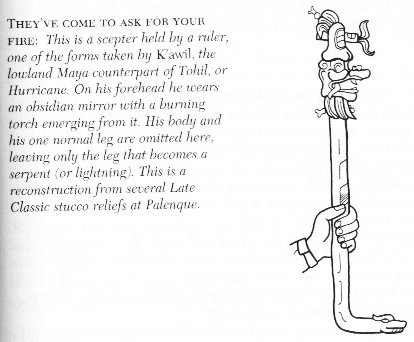 |
|
... According to
Gylfaginning, following the
murder of Baldr by Loki, the other
gods brought his body down to the
sea and laid him to rest on the
ship. They would have launched it
out into the water and kindled a
funeral pyre for Baldr but were
unable to move the great vessel
without the help of the giantess
Hyrrokkin, who was sent for out of
Jötunheim. She then flung the ship
so violently down the rollers at the
first push that flames appeared and
the earth trembled, much to the
annoyance of Thor. Along with Baldr,
his wife Nanna was also borne to the
funeral pyre after she had died of
grief. As Thor was consecrating the
fire with his hammer Mjolnir, a
dwarf named Litr began cavorting at
his feet. Thor then kicked him into
the flames and the dwarf was burned
up as well ...
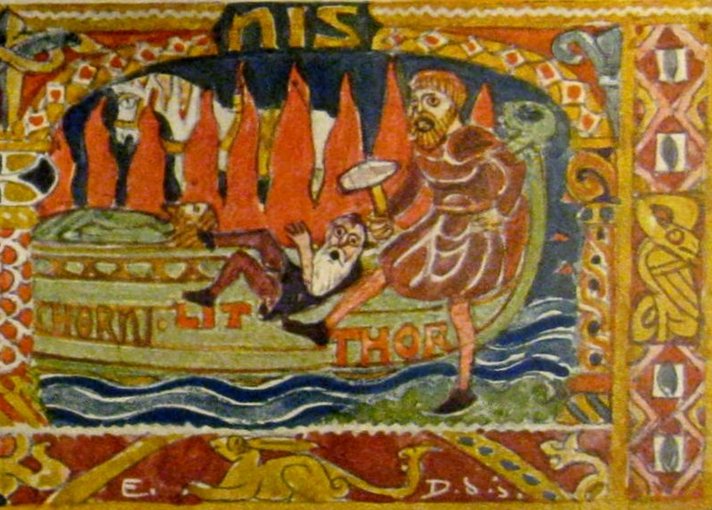 |
|
te ahi ki puhu ki
tunu te ika.he ui ka kore
he a(-) |
'Make a
fire and prepare the fish!' When
he saw that there was no fire [he
ui ka kore he ahi], Ira said,
'One of you go and bring the fire
from Hanga Te Pau'.
One of the young men went to the
fire, took the fire and provisions
(from the boat), turned around, and
went back to Hanga Hoonu. When he
arrived there [he tuu], he
sat down [he noho].
They prepared [he tunu]
the fish in the fire on the flat
rocks, cooked them, and ate until
they were completely satisfied.
Then they gave the name. 'The
rock, where (the fish) were prepared
in the fire with makoi (fruit
of Thespesia populnea?)
belongs to Ira'. |
|
hi he ki a
(i)ra.ka oho etahi ki
te ahi ka
too |
| mai.mai hanga te
pau.he oho mai etahi kope |
| ki
te ahi he
too atu
koia ko kai he hoki he oho |
| he tuu ki hanga
hoonu he tuu he noho he tunu i te |
| ika.i runga i te
papa he ootu he kakai ka ma(-) |
| konakona ro.he
nape i te ingoa.ko te papa tu(-) |
|
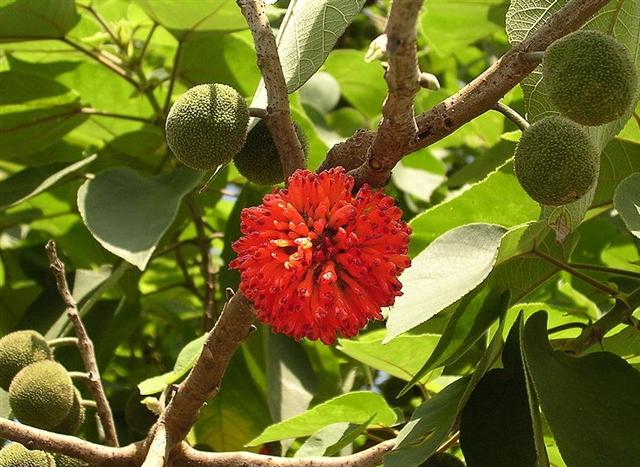
Makoi. The
tree which on T. was called miro,
Thespesia populnea. Van
Tilburg. Makoikoi, kidney T.
Churchill.
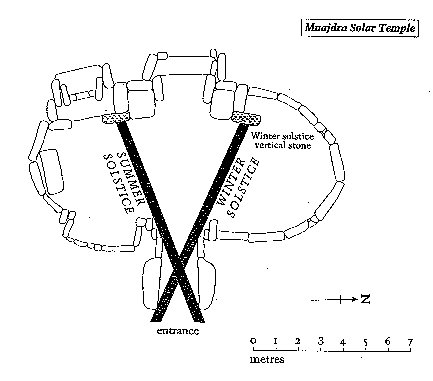
... The Mnajdra Temple is located on
Malta and very ancient, dating to
the time before the pyramids. Marija
Gimbutas: 'To sleep within the
Goddess's womb was to die and to
come to life anew'. In a system of
reincarnation the old one must die
in order to be reborn, of course. At
midsummer Sun comes to a standstill,
and this must therefore be an
occasion when the 'flame of life'
had to be transported into a new
body ... |
|
nu makoi a
Ira.he
noho erima raa i hanga ho(-) |
They remained in Hanga Hoonu for
five days. |
|
onu. |
|
... needfire ceremonies
usually take place near the summer solstice (the
Feast of St. John) ... but they occur in several
other seasons as well. The summer date of the
rite and its accompanying festival have to do,
among other things, with fertility, as can can
clearly be seen in a variant from the valley of
the Moselle preserved for us by Jakob Grimm.
Each household in the village was constrained to
contribute a shock of straw to the nearby high
place, Stromberg, where the males went at
evening while the females went to a spring lower
down on the slope. A huge wheel was wrapped with
this straw. An axle run through the wheel served
as the handles for those who were to guide it on
its downward plunge. The mayor of a nearby town
kindled the straw, for which office he was
rewarded with a basketful of cherries. All the
men kindled torches and some followed the
burning orb as it was released downhill to
shouts of joy. The women at the spring echoed
these shouts as the
wheel rushed by them. Often the fire went out of
its own accord before it reached the river, but
should the waters of the river extinguish it, an
abundant vintage was forecast for that year ... |
|
E:26 |
|
... In the beginning were Rangi
and Papa, Sky and Earth.
Darkness existed. Rangi
adhered over Papa his wife.
Man was not. A person arose, a
spirit who had no origin; his name
was Rangitokona, the
Heaven-propper. He went to Rangi
and Papa, bid them go apart,
but they would not. Therefore
Rangitokona separated Rangi
and Papa, he thrust the sky
above. He thrust him with his
pillars ten in number end to end;
they reached up to the
Fixed-place-of-the-Heavens. After
this separation Rangi
lamented for his wife: and his tears
are the dew and the rain which ever
fall on her. This was the chant that
did the work:
Rangitokona,
prop up the heaven! //
Rangitokona, prop up the
morning! // The pillar stands in the
empty space. The thought [memea]
stands in the earth-world - //
Thought stands also in the sky. The
kahi stands in the
earth-world - // Kahi stands
also in the sky. The pillar stands,
the pillar - // It ever stands, the
pillar of the sky. Then for the
first time was there light between
the Sky and the Earth; the world
existed ...
|
 |
 |
|
kahi |
tapa mea |
|
|
i te rua te
kauatu matoru raa o te ana(-) |
On the
twenty-third day of the month of
July ('Anakena', they reached Rangi
Meamea. When they arrived there,
they looked around and gave the name
'Rangi Meamea A Hau Maka'. They
also named the mountain 'Peke Tau O
Hiti [A] Hau Maka'. |
|
kena i
oho mai ai ki rangi meamea.he |
| tuu he ui he
tikea he nape
i te ingoa.ko ra(-) |
|
ngi meamea.a
hau maka.he nape tokoa |
|
i te ingoa o
te maunga ko peke tau o hiti |
|
Peke.
1. To bite (of fish or
lobster pecking at fishhook). 2. To
repeat an action: he-peke te rua;
ina ekó peke-hakaou te rua don't
you do it a second time; ina ekó
peke hakaou-mai te rua ara,
don't come back here again. Vanaga.
To succeed, to follow. Pau.: peke,
to follow, to accompany. Ta.: pee,
to follow. Churchill. Mgv.:
Pekepeke. 1. The tentacles of
the octopus retracted. Mq.: peke,
to tuck up the clothes. Ma.:
pepeke, to draw up the legs and
arms. 2. A crab. Ha.: pee-one,
a crab that burrows in the sand.
Churchill. Hiti. 1. To show
itself again, to reappear (of the
new moon, of a constellation -
meaning uncertain). 2. Said of thin,
tough-fleshed fish of indifferent
taste: ika hiti. 3. Said of
fish when they come to the stones of
the shore for insects among the
seaweed: he hiti te ika. 4.
To reproach someone for his
ingratitude. Vanaga. 1. To rise, to
appear, to dawn; hitihaga,
rising; hitihaga roa,
sunrise; hitihiti, to dawn;
horau hitihiti, break of day;
hakahiti ki te eeve, to show
the buttocks. 2. Puffed; gutu
hiti, thick lips. Churchill. |
|
a hau maka.he
vari mai ki te
rua painga |
They
went around [he vari] to the
other side of the mountain Hau Epa,
looked around, and gave the name
'Hau Epa A Hau Maka'. |
| o maunga hau
epa.he tikea.he
nape i te |
|
ingoa ko
maunga hau epa. a Hau maka. |
|
Mauga. 1. Last; aga maúga o
te Ariki o Hotu Matu'a, King
Hotu Matua's last work. 2. Hill,
mountain. Mouga, moúga. Last;
vânaga moúga o te Ariki O Hotu
Matu'a, the last words of King
Hotu Matu'a. Vanaga. Mauga kore,
impalpable. Mouga. 1. Enough,
that's all, at last. 2. Mountain,
ridge of hills; mouga iti,
hillock; tua mouga, mountain
top; hiriga mouga; hillside,
declivity, slope. P Pau.: mahuga,
mountain. Mgv.: mou, maga,
mountain. Mq.: mouna,
mouka, peak or crest of a
mountain. Ta.: maua, moua,
mountain. 3. Extinction, end,
interruption, solution; te mouga
o te hiriga, end of a voyage;
pagaha mouga kore, without
consolation. 4. To get. Churchill.
Epa. To extend horizontally,
to jut out. Vanaga. |
| he vari hokoou
mai ki te rua
painga o |
Not translated by
Barthel. |
|
maunga hau epa. |
|
Vari. 1. Menstruation,
period (also: tiko). 2. To
tack, to veer (nautical);
ku-vari-mai-á te miro, the boat
arrives, have veered [around Rano
Kau]. Vanaga. About,
circumference, to turn in a circle;
hakavari, pliant, to bend,
square; varivari, about, to
go around; vavari, a garland;
varikapau, circumference, to
surround, a compass, to admire;
hiriga varikapau, to go in a
ring; pa varikapau, to close
in; varitakataka (vari-taka
3) to surround. Churchill. Pau.:
Vari, marsh, mire, dirt. Ta.:
vari, dirt, mud. Rar.: vari,
mud. Churchill. Mgv.: Vari,
paste well diluted. Mq.: vaivai,
to dilute, to thin. Ha.: waliwali,
soft, pasty. Churchill. |
|
... Ebony label
EA 32650 from Den's tomb. The
upper right register depicts king
Den twice: at the left he is sitting
in his Hebsed pavilion, at the right
he is running a symbolic race around
D-shaped markings. This ceremony is
connected to the so-called 'race of
the Apis bull'. The middle right
section reports about the raid of
the city 'beautiful door' and about
a daughter of Den suffering from an
unknown disease. The lower right
section reports about the visitation
of the 'souls of Peh' at the royal
domain 'Wenet'. The left part of the
label describes the content of the
vessel that once belonged to the
label and mentions the high official
Hemaka, who was obviously
responsible for the delivery of the
labeled jar ...
.jpg) |
|
Paina. Human likeness, large doll
(made in ancient times). Vanaga. T. To
make a noise. H. To sound, as in
breaking or tearing anything. Churchill.
Although the Easter Islanders still
cautiously kept all their small stone
and wood carvings in hiding, they did
reveal their own artistic talent and
activity by carrying forth colossal
paina figures in the presence of the
Spaniards [1770]. These were skilfully
made light-weight dolls of superhuman
size, fashioned from painted bark-cloth
stuffed with branches, grass, and reeds.
They were carried in processions and
erected at the side of old image
platforms, as if they represented some
substitute for the giant stone men of
the Middle Period that this historic or
Late Period population was unable to
carve or erect. Agüera (Ibid., p.
95) gave the following account of the
paina figures, after a description
of the ancient stone statues of which an
unspecified number were still standing
on ahu: 'They have another effigy
or idol clothed and portable which is
about four yards in length: it is
properly speaking the figure of a Judas,
stuffed with straw or dried grass. It
has arms and legs, and the head has
coarsely figured eyes, nostrils, and
mouth: it is adorned with a black fringe
of hair made of rushes, which hangs
half-way down the back. On certain days
they carry this idol to the place where
they gather together, and judging by the
demonstrations some of them made, we
understood it to be the one dedicated to
enjoyment... (Heyerdahl 3) Der Cultus bestand in Anrufung der
Götter, deren Willen der Priester
erklärte, in Opfern an Lebensmitteln,
auch an Menschen, und in der Feier
gewisser, zu bestimmten Zeiten
wiederkehrender Feste (rakauti),
von denen das erste im Früjahr 2 Monate
dauerte, das zweite im Sommer mit der
Errichtung einer Pyramide aus Zweigen (paina)
endete, das dritte in den Winter fiel;
bei allen fanden Tänze, Gesänge, Spiele
aller Art statt. (Churchill: From Die
Inseln des stillen Oceans by Carl E.
Meinicke; zweiter Theil, 1876, p. 228.)
... 'In Upper Egypt', wrote
Sir James G. Frazer in The Golden Bough,
citing the observations of a German
nineteenth-century voyager, 'on the first day of
the solar year by Coptic reckoning, that is, on
the tenth of September, when the Nile has
generally reached its highest point, the regular
government is suspended for three days and every
town chooses its own ruler. This temporary lord
wears a sort of tall fool's cap and a long
flaxen beard, and is enveloped in a strange
mantle. With a wand of office in his hand and
attended by men disguised as scribes,
executioners, and so forth, he proceeds to the
Governor's house. The latter allows himself to
be deposed; and the mock king, mounting the
throne, holds a tribunal, to the decisions of
which even the governor and his officials must
bow. After three days the mock king is committed
to the flames, and from its ashes the Fellah
creeps forth ... |
|
E:27 |
|
...
The pantheon of creator gods, the
spirits of deified ancestors, and
the adventures of legendary,
semi-divine heroes are central to
spiritual life in Polynesia. Extant
figures of gods and deified
ancestors often bear scant
resemblance to their original
presentation, for they were
frequently wrapped in barkcloth and
ornamented with tufts of feathers as
a sign of their tapu
or
sacred, restricted status. Some
figures were kept hidden in god
houses, or, in the case of ancestral
spirits, in the homes of lineage
heads; others were displayed
prominently in temples. Many of the
figures are richly layered in
meaning, referring both
iconographically and stylistically
to concepts of power, history, time
and space, the land, gods, and
ancestors. These multiple-allusions
may be expressed by the concept of
kaona [taoga], a
Hawaiian word that means 'veiled
meaning or symbolism', which is a
well-known feature of poetry, music,
and dance ... All Polynesian
cultures share a concern not only
with their own genealogy and
history, but also with understanding
the nature of the creation of the
earth and the beginning of time.
Throughout Polynesia, elite lineages
trace their ancestry to the gods.
Among the Maori, tribal accounts of
their history extend back to
creation; these stories share
similarities, and all are presented
in art works, known as taonga,
'the treasures of the people'.
Appropriately, given the mana
of war canoes, the stern and prow
ornaments depicted central themes in
Maori cosmogony.
Many prows
depict the creation of the earth and
sky.
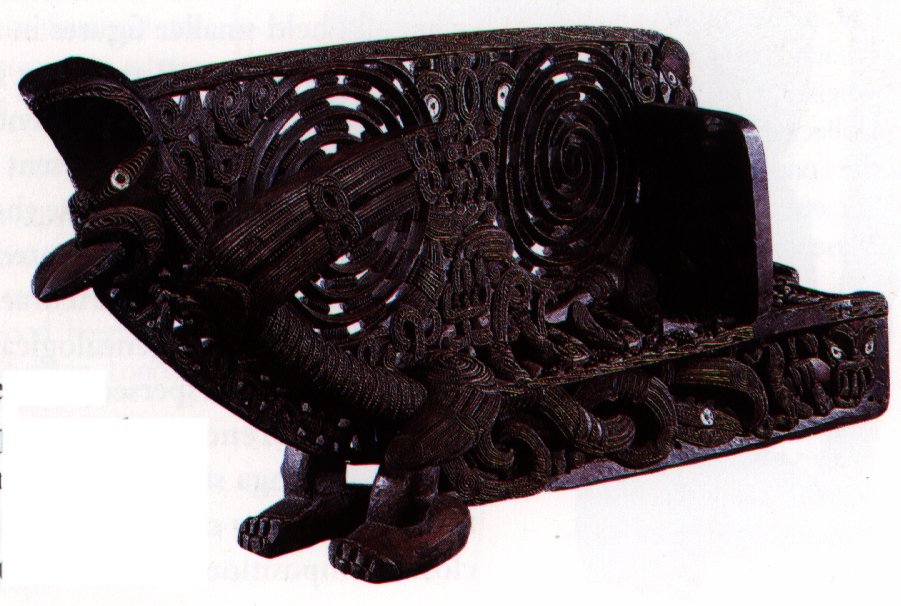
The
openwork spirals on the main panel
may represent the entry of light and
knowledge into the world when the
god Tane
separated his parents Papatuanuku
and Rangi, Earth Mother and
Sky Father. The foremost figure
depicts a male with aggressively
protruding tongue. He may represent
Tuumatauenga, the god of war
and man .. |
|
i ka onga mai nei ko
te one
ku tea ku ri(-) |
When he saw (i.e., Ira) that the
beach was white and clean, he said,
'Hey you! Here is the plain where
the king can live!' They stayed
there and surveyed the plain with
great care.
Ira knew with certainty that it
was very good.
He named the bay 'Hanga Moria
One' and the plain 'Oromanga'. |
|
torito ana. he ki he ro korua e.i
ana |
|
nei te
maara.mo noho mo te ariki he
no(-) |
|
ho.he ata rarama i te maara.he
angiangi |
|
rivariva e Ira.he
nape i te ingoa o te hanga |
|
ko hanga
moria one a Hau maka.he nape |
|
i te ingoa
o te maara ko oromanga.he
noho |
|
One, sand. Oneone
(reduplication of oone which
see below), dirty, covered in soil,
in mud. Vanaga. Oone, ground,
soil; mud; dirty, to get dirty.
Vanaga. One, sword. (Cf.
oe, dorsal fin; àè,
sword.) Ta.: óé, sword,
lance. Churchill. Oone, sand,
clay, dirt, soil, mire, mud, muck,
gravel, filth, manure, dust, to
dirty; ao oone, shovel;
egu oone vehuvehu, mud; moo
te oone, shovel; oone
hekaheka, mud; puo ei oone,
to daub; kerihaga oone,
husbandman; oone veriveri,
mud; oone no, muck, to dirty,
to powder; vai oone, roiled
water; oone rari, marsh,
swamp; oonea, dirty T;
ooneoone, sandy; oonevai,
clay T; hakaoone, to pollute,
to soil. P Mgv.: one, land in
general, earth, soil. Mq.: one,
sand, beach. Ta.: one, sand,
dust, gravel. Churchill.
Miro-oone, model boat made of
earth in which the 'boat festivals'
used to be celebrated. Vanaga.
... on the first
day of the year the natives dress in
navy uniforms and performs exercises
which imitate the maneuvers of
ships' crews ... Métraux.
Maara. Flat coastal area
usable as landing stage. Vanaga. |
|
he hakaora anake. i ka ui atu ena
ko te |
They all [anake] sat down [he
noho] and rested [he hakaora],
when suddenly they saw that a turtle
had reached the shore and had
crawled up on the beach. He looked
at it and said, 'Hey you! The turtle
has come on land!' He said, 'Let's
go! Let's go back to the shore'.
They all went to pick up the
turtle.
Ira was the first one [te kope
rae] to try to lift [he ketu]
the turtle - but she didn't move.
Then Raparenga said, 'You do not
have the necessary ability. Get out
of my way so that I can have a try!'
Raparenga stepped up and tried to
lift the turtle - but Raparenga
could not move her. |
|
honu
ku tomo ana ki uta ki runga ki te |
|
one.he tikea he ki he ro korua
e.ko te |
|
honu ku hoa ana ki uta he ki amua
ta (-) |
|
tou ki oho ki huri mai ki uta he
oho a(-) |
|
nake he tuu
he ketu mai i te honu.he oho |
|
te kope rae.ko Ira.he ketu mai i
te ho(-) |
|
nu.kai
ngaei mai.he ki atu a
raparenga |
|
ina ai o (koe) kei ka maeha koe
ki oho a(-) |
|
tu au.he oho a Raparenga.(h)e
ketu |
|
mai i te honu kai ngaei te honu i
a Raparenga |
|
Ketu. To bound, to climb
over, to leap, to jump, to raise (keetu).
Mq. ketu, to raise, to lift.
Ketuketu, to spread out,
hihi ketuketu, to turn
back the eyelids. Churchill. Pau.:
Ketuketu, to dig. Ta.:
etuetu, id. Mq.: ketu, to
dig up with the snout. Ma.: ketu,
id. Churchill. Mq.: ketuketu,
to snuff a candle. Sa.: eueu,
id. Churchill. Honu. 1.
Turtle. 2. Spider (the species found
in houses). Vanaga. Turtle. P Mgv.:
honu, onu, id.
Mq.,Ta.: honu, id. To.:
fonu, id. Ha.: honu, id.
Churchill. To.: fonu, turtle,
tortoise, Fu., Niuē,
Uvea, Fotuna: fonu,
turtle ... Sa.: volu,
tortoise. Nukuoro: holu,
turtle. Viti: vonu,
turtle. Churchill 2. ... It
grew light, and again Ira
spoke. This is what he said: 'Turn
around, all of you, and go down to
ride the waves (literally, 'to the
turtle, to act like a turtle') ...
Barthel 2.
Gae. Gaegae, short of
breath, out of breath, breathless.
PS Mgv.: aeaea, short of
breath, to breathe with difficulty,
to feel suffocated; gaegae,
to have a feeble voice. Mq.:
naenae, kaekae, short of
breath, unable to breathe,
suffocated. Ta.: áeáe, short
and painful breathing, as one at the
point of death. Sa.: gae, to
breathe hard, to pant, to be out of
breath. Uvea: gaegae, out of
breath. Fu.: gaigaisā.
id. Gaehe, to boil.
Gaei, to shake, to contract, to
move (gaeiei, gaiei,
geigei, garei,
gerei); ua gaiei,
pulsation; hakagaie, to
shake, to wave, to waddle, to twist
the body about; ahi hakagaie,
a night signal; hakagerei, to
shake. Churchill. |
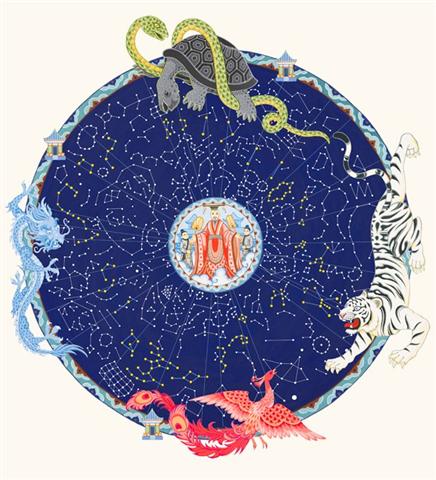
|






.jpg)

